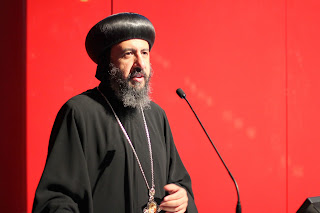Coptic Culture:
Past, Present, & Future
 Held
at The Coptic Orthodox Centre in Stevenage, United Kingdom on 5-7 June 2015, the
third International Symposium on Coptic Culture: Past, Present, & Future focused on the
richness of the daily life experience of Egypt’s Christian presence throughout
history. The Symposium’s title “Ordinary Lives, Changing Times” underscored the
importance of exposing some of the lesser known aspects of Coptic lives in Late
Antiquity and beyond.
Held
at The Coptic Orthodox Centre in Stevenage, United Kingdom on 5-7 June 2015, the
third International Symposium on Coptic Culture: Past, Present, & Future focused on the
richness of the daily life experience of Egypt’s Christian presence throughout
history. The Symposium’s title “Ordinary Lives, Changing Times” underscored the
importance of exposing some of the lesser known aspects of Coptic lives in Late
Antiquity and beyond.
Scholars
from Canada, the United States, Denmark, the Netherlands, Germany, the UK,
Egypt and Australia came together to present their latest research on Coptic
Culture. The disciplines explored were equally varied: archaeology, art
history, ethnography, language, and history. The talks were as varied as their
disciplines, ranging from discussing the attire of Copts, to analysing aspects
of the provision and production of food in monasteries, to an examination of the
history of Eucharistic wine in the Coptic Church, and the traditions of bridal
dowry payments.
 The international
audience consisted of experts who travelled to take part in the symposium, and
members of the broader Coptic and Egyptian community in the U.K. The diversity
of backgrounds of speakers and attendees made for lively and in-depth
discussions.
The international
audience consisted of experts who travelled to take part in the symposium, and
members of the broader Coptic and Egyptian community in the U.K. The diversity
of backgrounds of speakers and attendees made for lively and in-depth
discussions.
The keynote address was held at the British Museum in London on June 5th. Under
the title “Creating a digital (Coptic) Old Testament”, Professor Heike Behlmer
of the University of Göttingen presented her project on collecting and digitising fragments of the Coptic Old Testament,
currently dispersed in private and public collections around the globe. The fragments, preserved on
a variety of materials, are being digitally collated and made accessible online
for the first time.
During
his closing speech at the British Museum, Bishop Angaelos said:
 “For
us to come together to speak about Coptic culture is significant because
culture is not only the place of antiquity, but it presents life. This
Symposium presents a wonderful marriage between a very rich culture and history
and a very dynamic and vibrant present. Exploring our cultural history enables
us to look at what we have received and consider how we can translate that into
our current thoughts, words and dreams for the future. The works we have now
are a result of our heritage; the works of the future will be the result of
what now will be someone else’s heritage, this is a continuous journey.”
“For
us to come together to speak about Coptic culture is significant because
culture is not only the place of antiquity, but it presents life. This
Symposium presents a wonderful marriage between a very rich culture and history
and a very dynamic and vibrant present. Exploring our cultural history enables
us to look at what we have received and consider how we can translate that into
our current thoughts, words and dreams for the future. The works we have now
are a result of our heritage; the works of the future will be the result of
what now will be someone else’s heritage, this is a continuous journey.”
Dr
Mariam Ayad, Associate Professor of Egyptology at the American University in
Cairo, Egypt and organizer of the symposium said:
"The
symposium's theme this year, highlighting aspects of the daily life experience
of ordinary Copts, underscored how in some respects very little has changed,
despite the great technological advances that separate us from those Late
Antique lives that were discussed over the course of the weekend. People are
people -- everywhere, and at any time period. Examining the lives of ordinary
people breathes life into history, enabling us to relate to historical
figures. Their problems and concerns are the same as ours, including
issues of debt, violence, grief, managing a household efficiently, amongst
other things."
The various
talks presented at the symposium addressed a gap in scholarship, which has
often overlooked the social historical aspects of the Coptic experience. Their
presentations fostered a lively discussion of what it means, whether now or in
the past, to be a productive, integrated citizen in Egypt and beyond. The
symposium organisers hope that these discussions will continue and further an
active and dynamic dialogue on Coptic identity and heritage.
More photographs from the Symposium will be available soon via this link: HERE or by visiting Reflections by HG Bishop Angaelos on Facebook.

